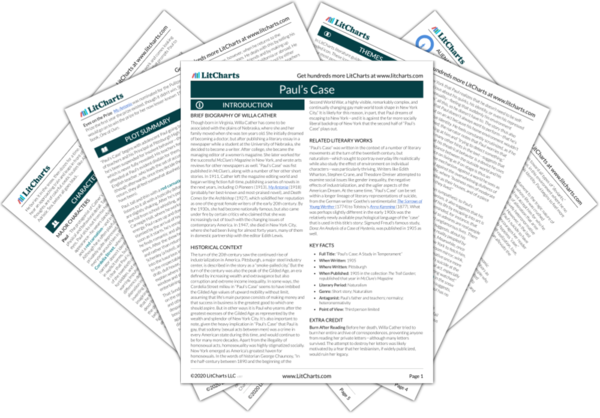“Paul’s Case” describes Paul’s socioeconomic background as middle-class and his neighbors as “burghers” (a term originally describing people who had to work to make money rather than living off inherited wealth). That term is, in fact, a clue to how Cather wants to both explore and critique Paul’s own disdain for hard work and the need to make a living. For Paul, the need to worry about money at all is depressing and embarrassing: for him wealth, when there’s enough of it, becomes a near-magical elixir that will grant him the freedom he craves. But the story cautions against such a mystical view of money, suggesting that there’s no shortcut to the hard work it takes to earn it—and even that the more humdrum, realistic view of money as espoused by the Cordelia Street burghers is not as horrifying as Paul finds it to be.
Though Cordelia Street is not poor per se, its inhabitants, including Paul’s father, do have to worry about money. His sisters exchange tips on mending dresses, and the family washes with “ill-smelling soap.” Horrified by such dreariness, Paul keeps a small vial of violet water to use instead—one of the many ways he chooses the values of an aesthete over those of Cordelia Street. Paul’s father, meanwhile, only allows him to work as an usher in Pittsburgh’s Carnegie Hall (the space of Paul’s “fairy-tale” imagination) because he thinks that it’s good for a boy to have a job. Paul’s father would love for his son to follow the path of the neighbor, a clerk—a formerly dissolute young man who now has a stable job, a wife, and four kids, and from whose life Paul recoils in horror. In some ways, the story’s damning descriptions of the Cordelia Street neighbors with their potbellied husbands and children’s love of arithmetic reflects Cather’s sympathy with Paul’s horror. In other ways, though, such as by briefly noting that Paul’s mother has died, the story implies that there might be good reasons for Paul’s father to embrace hard work and slow progress—reasons having do with his own desires for stability and comfort.
At the same time, the story also shows Paul’s attitude toward money to be deeply unrealistic. His inability to grasp that even actors are just people with families making a living underlines his own idealistic, fantastical way of seeing the world. More strikingly, his theft from Denny & Carson, which funds his trip to New York, underlines Paul’s failure to understand money as tied to work, rather than as a kind of golden ticket to another kind of life. This money is ultimately paid back by Paul’s father, though, notably, Paul hardly lingers over that sacrifice. Once he arrives in New York, Paul sees the city itself as the “glaring affirmation of the omnipotence of wealth,” a wealth that seems scrubbed free from any of the labor that went into producing it.
Paul can’t imagine working in order to earn money. Before New York, he works as an usher only because it gives him access to a realm of musical and artistic splendor. By the end of “Paul’s Case,” the money he’s stolen is running out, and it never seems to occur to Paul that he might have to work to support himself, failing yet again to see any connection between wealth and hard work. Depicting Paul as wanting only to “float on the wave” of such wealth, the story critiques such a naïve view, showing it to be both unsustainable and tragically limited in its understanding of reality. Paul’s death is a product of many converging forces—having to do, first and foremost, with the alienation he feels due to his homosexuality—but it is perhaps just as much a product of his unrealistic views of money and wealth. In this way, Cather reminds readers that idealism must be tempered with a practical and realistic outlook on what it takes to achieve any form of adulthood and independence in this world—and that is money.
Money and Wealth ThemeTracker

Money and Wealth Quotes in Paul’s Case
He seemed to feel himself go after her up the steps, into the warm, lighted building, into an exotic, a tropical world of shiny, glistening surfaces and basking ease.

Unlock explanations and citation info for this and every other Paul’s Case quote.
Plus so much more...
Get LitCharts A+It was a highly respectable street, where all the houses were exactly alike, and where business men of moderate means begot and reared large families of children, all of whom went to Sabbath-school and learned the shorter catechism, and were interested in arithmetic; all of whom were as exactly alike as their homes, and of a piece with the monotony in which they lived.
When he was shown to his sitting-room on the eighth floor, he saw at a glance that everything was as it should be; there was but one detail in his mental picture that the place did not realize, so he rang for the bell boy and sent him down for flowers.
Here and there on the corners whole flower gardens blooming behind glass windows, against which the snow flakes stuck and melted; violets, roses, carnations, lilies of the valley—somehow vastly more lovely and alluring that they blossomed thus unnaturally in the snow.
Had he ever known a place called Cordelia Street, a place where fagged looking business men boarded the early car? Mere rivets in a machine they seemed to Paul—sickening men, with combings of children’s hair always hanging to their coats, and the smell of cooking in their clothes.
He had not a hundred dollars left; and he knew now, more than ever, that money was everything, the wall that stood between all he loathed and all he wanted.











